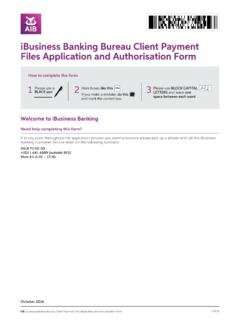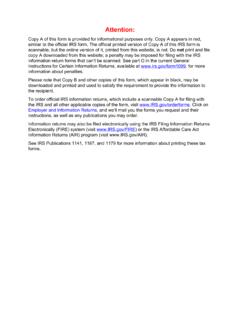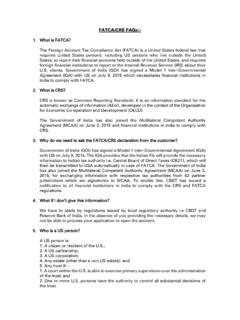Transcription of FATCA and CRS Entity Classification Guides
1 Page 1 of 5 Self-certification is required under the US Foreign Account Tax Compliance Act ( FATCA ) and the OECD* Common Reporting Standard (CRS). While the questions and definitions are similar, there are differences which impact some Entities that need to be carefully considered. As a consequence, definitions require careful attention and self-certification under FATCA and CRS needs to be completed independently. FATCA Entity definitions .. page 1 CRS Entity definitions .. page 4*Organisation for Economic Cooperation and DevelopmentSection A - FATCAFATCA is a legal framework which requires AIB to report details of financial accounts held by US citizens and persons tax resident in the US to the Irish revenue on an annual basis who will then exchange this information with the US tax and CRS Entity Classification GuidesDetailed Entity DescriptionsSection A - FATCA US PersonA US Person means a US citizen or US resident individual, a partnership or corporation organised in the United States or under the laws of the United States or any State thereof, a trust if (i)
2 A court within the United States would have authority under applicable law to render orders or judgements concerning substantially all issues concerning administration of the trust, and (ii) one or more US persons have the authority to control all substantial decisions of the trust, or an estate of decedent that is a citizen or resident of the United States. This shall be interpreted in accordance with the US internal revenue US PersonThe term specified US Person means a US person other than:i. a corporation, the stock of which is regularly traded on one or more established securities markets;ii. any corporation that is a member of the same expanded affiliated group, as defined in Section 1471(e)(2) of the US internal revenue Code, as a corporation described in clause (i);iii.
3 The United States or any wholly owned agency or instrumentality thereof;iv. any State of the United States, any US Territory, any political subdivision of any of the foregoing, or any wholly owned agency or instrumentality of any one or more of the foregoing;v. any organization exempt from taxation under section 501(a) or an individual retirement plan as defined in section 7701(a)(37) of the US internal revenue Code;vi. any bank as defined in section 581 of the US internal revenue Code;vii. any real estate investment trust as defined in section 856 of the US internal revenue Code;viii. any regulated investment company as defined in section 851 of the US internal revenue Code or any Entity registered with the Securities Exchange Commission under the Investment Company Act of 1940 (15 USC.)
4 80a-64);ix. any common trust fund as defined in section 584(a) of the US internal revenue Code;x. any trust that is exempt from tax under section 664(c) of the US internal revenue Code or that is described in section 4947(a)(1) of the US internal revenue Code;xi. a dealer in securities, commodities, or derivative financial instruments (including notional principal contracts, futures, forwards, and options) that is registered as such under the laws of the United States or any State; orxii. a broker as defined in section 6045(c) of the US internal revenue US PersonThe term Other US Person should be taken to mean a US Person who meets the criteria set out in points (i) to (xii) further information on FATCA please contact your tax advisor or log on to 2 of 5 For further information on FATCA please contact your tax advisor or log on to A - FATCA Non-Financial Foreign Entity (NFEE)Non-Financial Foreign Entity (NFFE): Entities which are non-US Entities, and are not Financial Institutions will be regarded as being an NFFE.
5 Each NFFE must be classified as either an Active NFFE or a Passive Active NFFEAn NFFE will be regarded as an Active NFFE if it meets any one of the following:a. Less than 50 per cent of the NFFE s gross income for the preceding calendar year or other appropriate reporting period is passive income and less than 50 per cent of the assets held by the NFFE during the preceding calendar year or other appropriate reporting period are assets that produce or are held for the production of passive income;b. The stock of the NFFE is regularly traded on an established securities market or the NFFE is a Related Entity of an Entity the stock of which is traded on an established securities market;c. The NFFE is organised in a US Territory and all of the owners of the payee are bona fide residents of that US Territory;d.
6 The NFFE is a non-US government, a government of a US Territory, an international organization, a non-US central bank of issue, or an Entity wholly owned by one or more of the foregoing;e. Substantially all of the activities of the NFFE consist of holding (in whole or in part) the outstanding stock of, and providing financing and services to, one or more subsidiaries that engage in trades or businesses other than the business of a Financial Institution, except that an NFFE shall not qualify for this status if the NFFE functions (or holds itself out) as an investment fund, such as a private equity fund, venture capital fund, leveraged buyout fund or any investment vehicle whose purpose is to acquire or fund companies and then hold interests in those companies as capital assets for investment purposes;f.
7 The NFFE is not yet operating a business and has no prior operating history, but is investing capital into assets with the intent to operate a business other than that of a Financial Institution; provided, that the NFFE shall not qualify for this exception after the date that is 24 months after the date of the initial organisation of the NFFE;g. The NFFE was not a Financial Institution in the past five years, and is in the process of liquidating its assets or is reorganising with the intent to continue or recommence operations in a business other than that of a Financial Institution;h. The NFFE primarily engages in financing and hedging transactions with or for Related Entities that are not Financial Institutions, and does not provide financing or hedging services to any Entity that is not a Related Entity , provided that the group of any such Related Entities is primarily engaged in a business other than that of a Financial Institution;i.
8 The NFFE meets all of the following requirements: i. It is established and maintained in its country of residence exclusively for religious, charitable, scientific, artistic, cultural, or educational purposes; ii. It is exempt from income tax in its country of residence; iii. It has no shareholders or members who have a proprietary or beneficial interest in its income or assets; iv. The applicable laws of the Entity s country of residence or the Entity s formation documents do not permit any income or assets of the Entity to be distributed to, or applied for the benefit of, a private person or non-charitable Entity other than pursuant to the conduct of the Entity s charitable activities, or as payment of reasonable compensation for services rendered, or as payment representing the fair market value of property which the Entity has purchased; and v.
9 The applicable laws of the Entity s country of residence or the Entity s formation documents require that, upon the Entity s liquidation or dissolution, all of its assets be distributed to a governmental Entity or other non-profit organization, or escheat to the government of the Entity s country of residence or any political subdivision Any NFFE within the definition of an Excepted NFFE in US Treasury Passive NFFEA Passive NFFE is any NFFE that is not: (i) an Active NFFE or (ii) a Withholding Foreign Partnership, Withholding Foreign Trust, or a Qualified Intermediary pursuant to relevant US Treasury 3 of 5 For further information on FATCA please contact your tax advisor or log on to A - FATCA Financial InstitutionsThe term Financial Institution means a Custodial Institution, a Depository Institution, an Investment Entity or a Specified Insurance Compliant Financial InstitutionAn Entity will be deemed compliant if it is listed in Part II of Annex II to the Irish US Inter-Governmental Agreement (IGA) or is within the definition of a Deemed Compliant FFI set out in the US Regulations.
10 There are two categories of deemed compliant institutions self-certified or Deemed Compliant Institutionsi) Certified Deemed Compliant Financial Institutions listed in the Agreement Non Profit Organisations (Charitable organisations that qualify for exemption from tax in accordance with section 848A and Schedule 26A of the Taxes Consolidation Act 1997, or bodies established for the promotion of athletic or amateur games or sports that have been granted exemption from tax in accordance with section 235 of the Taxes Consolidation Act 1997 by the revenue Commissioners). Financial Institutions with a local client base which meets all of the conditions set out in Annex II of the IGA , and Certain Collective Investment ) Certified Deemed Compliant Financial Institutions listed in the US Regulations Non registering local banks, Financial Institutions with only low value accounts, Sponsored closely held investment vehicles, Limited Life debt investment entities, Owner documented Financial Institutions, iii) Certain Investment advisors and Investment Deemed Compliant Financial InstitutionsThe Financial Institutions falling within this category are not included as Deemed Compliant Financial Institutions under the IGA.










